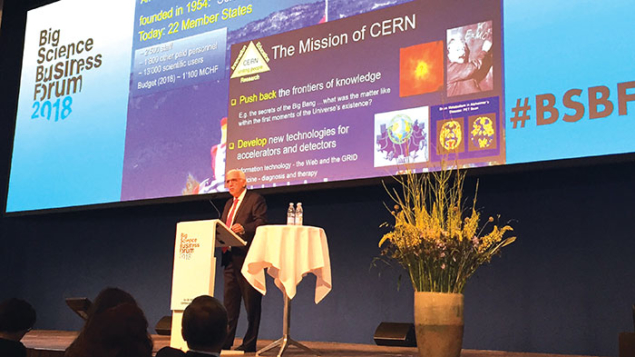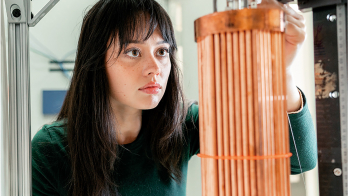
Big science equals big business, whether it is manufacturing giant superconducting magnets for particle colliders or perfecting mirror coatings for space telescopes. The Big Science Business Forum (BSBF), held in Copenhagen, Denmark, on 26–28 February, saw more than 1000 delegates from more than 500 companies and organisations spanning 30 countries discuss opportunities in the current big-science landscape.
Nine of the world’s largest research facilities – CERN, EMBL, ESA, ESO, ESRF, ESS, European XFEL, F4E and ILL – offered insights into procurement opportunities and orders totalling more than €12 billion for European companies in the coming years. These range from advisory engineering work and architectural tasks to advanced technical equipment, construction projects and radiation-resistant materials. A further nine organisations also joined the conference programme: ALBA, DESY, ELI-NP, ENEA, FAIR, MAX IV, SCK•CEN – MYRRHA, PSI and SKA, thereby gathering 18 of the world’s most advanced big-science organisations under one roof.
The big-science market is currently fragmented by the varying quality standards and procurement procedures of the different laboratories, delegates heard. BSBF aspired to offer a space to discuss the entry challenges for businesses and suppliers – including small- and medium-sized enterprises – who can be valuable business partners for big-science projects.
“The vision behind BSBF is to provide an important stepping stone towards establishing a stronger, more transparent and efficient big-science market in Europe and we hope that this will be the first of a series of BSBFs in different European cities,” said Agnete Gersing of the Danish ministry for higher education and science during the opening address.
Around 700 one-to-one business meetings took place, and delegates also visited the European Spallation Source and MAX IV facility just across the border in Lund, Sweden. Parallel sessions covered big science as a business area, addressing topics such as the investment potential and best practices of Europe’s big-science market.
“Much of the most advanced research takes place at big-science facilities, and their need for high-tech solutions provides great innovation and growth opportunities for private companies,” said Danish minister for higher education and science, Søren Pind.








